written by Bernard Slade
Episode # 1
"What? And Get Out of Show Business?"
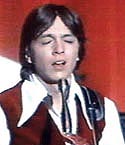
The episode that started it all! A recently widowed mother joins her kids' rock band to make ends meet.
Episode # 3
"Whatever Happened To The Old Songs?"
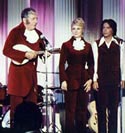
Shirley's father decides to leave her mother, and join the family group.
Episode # 5
"When Mother Gets Married"

When Shirley dates an old flame, the kids doubt his sincerity.
Episode # 8
"But The Memory Lingers On"
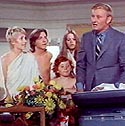
The show must go on after a skunk stows away aboard the Partridge Family bus.
Episode # 13
"Star Quality"
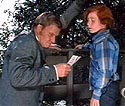
When a newspaper columnist gives Danny a glowing revue, he decides to leave the group and go solo.
Episode # 17
"Why Did The Music Stop?"

The kids quit the group so Shirley can date an obstetrician.
Episode # 25
"A Knight In Shining Armor"
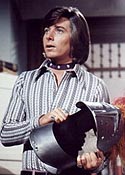
Pilot for the series "Getting Together". Bobby Sherman plays a songwriter in search of a lyricist.
Episode # 36
"I Can Get It For You Retail"

Danny auctions off Keith's possessions in order to buy Mom a mink coat for her birthday.
Episode # 38
"Don't Bring Your Guns To Town, Santa"
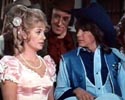
When the Partridge Family's bus breaks down in a ghost town on Christmas Eve, an old prospector entertains them with a story.

Continued...
GH: Was the role of Keith originally conceived as an airhead?
BS: I don’t think he was written as an airhead, but we needed something that gave him some sort of character. He was very good looking and sang very well, so there had to be some sort of fault that gave the other family members reason to interact with him. So we made him a bit vain or egocentric, which actually helped the show quite a lot, and David was very smart to play that.
GH: Well, if the character was too perfect, then nobody would like him or be able to relate to him.
BS: Right. There had to be some kind of fault, to bring him down to earth, in a way.
GH: The character of Laurie evolved over the course of the series too.
BS: Originally, my idea was to write her a little more intellectual than the others and be involved in causes. The trouble is, when you don’t stay with the show, you have all sorts of other writers coming in and writing. It tends to deviate from the original somewhat. It’s not the same as today where writers tend to stick around longer.
GH: Why weren’t Chris and Tracy used more in the storylines?
BS: Both the kids weren’t really that talented. They were very young, and the writers would avoid writing for them. You could only give them one, maybe two lines. They were real little, so the focus went to the other kids. You couldn’t let one of them carry a story, because they didn’t have what it takes. The funny thing is, when they replaced Jeremy Gelbwaks, nobody really noticed. You could do those sorts of things then – it was television.
GH: Like when Darrin was replaced on "Bewitched".
BS: Well, that certainly affected the quality of the series, because Dick Sargent [Darrin # 2] wasn’t nearly as good as Dick York. But Chris was a lesser character.
GH: Other shows, "The Brady Bunch" for example, had child actors that could act. If the Partridge kids couldn’t carry a scene, why were they cast?
BS: I think they went for look. There were probably more talented kids out there, but it’s also hard to give a lot of weight to them when you had Shirley, Dave Madden, David, Susan and Danny. There wasn’t a lot of screen time left to write a story for two little kids, and the writers weren’t exactly leaping at the typewriter to do that. Of course, there was also a certain number of hours in the day that these kids could be worked.
GH: In the unaired pilot, Shirley's name is Connie. Do you have any recollection of why that was changed?
BS: In those days it may have been an ego thing; not so much with the actors, but with their agents or managers. It was kind of a common thing back then.
GH: Where did the idea for the bus come from?
BS: It came from a number of different places. I think it was a popular thing among rock bands at the time. It seemed natural that they would get a bus and go on the road. I wasn't a fan of rock and roll, but at that point, in the 60s, it was a sort of psychedelic period. Actually, my idea was to have it more like that – much more psychedelic. Not the Mondrian-styled shapes that it wound up being. In fact, I visualized a much smaller bus – like a van.
GH: Is it true that your original written pilot had the family perform in a smaller venue than Las Vegas?
BS: I don't think it was set in Vegas, that's for sure. I just saw the pilot again the other night and it seemed a little ridiculous that they would wind up in Vegas, especially being a new group. I'm not even sure of the value that they got from that. I guess they went and shot the strip with a second unit crew. Obviously it was written that they would perform and then freeze on stage, but I remember it being in a much smaller venue as originally written.
GH: It seems like it was difficult to make a decision between "Famous Rock Family" and "Struggling Unknown Family". Would one way or the other alienate an audience?
BS: In those days, there was no way you could have had them incredibly successful. Everything was middle-class white-bread America. The most successful shows were those about middle-class families, whether it was "The Donna Reed Show", or "Leave It To Beaver". Essentially, I never thought of this family as being widely successful. I never thought of them as this nation-wide phenomenon. We never really did any of the mass-hysteria type storylines. Without too much thought, we just figured it was a family that happened to get a few songs on the radio. But they weren't the Beatles by any means. They were just a garage band trying to make a living. In fact, most of the stories were not about performing. That was just the backdrop. It was a way to get the music in.
GH: Obviously, the music propelled the series to a level most shows can't reach. How prominent was the musical theme in your original pilot?
BS: It was very prominent right off the bat
GH: Were you involved in the musical side of the series?
BS: No, The music part of the show was something I had very little to do with. It was almost like a different production, a different world. They would go into the studio at night. In fact, my agent was very stupid about [the music aspect of the show] in that I never received any kind of percentage of the music. I thought the sort of music they chose for the series, however, was a perfect marriage. It wasn't too threatening.
GH: A few years before "The Partridge Family", Screen Gems had a major problem with "The Monkees". The actors wanted to play their own music and lawsuits followed. To avoid another hassle like this, did Screen Gems request you to cast the show with non-musical performers?
BS: Not that I remember. The initial plan all along was that all the music was going to be dubbed. David was not supposed to sing. When we hired him, we didn't know that he sang, we hired him just as an actor.
GH: Which came first when a script was being written? The story or the song?
BS: Oh, the scripts were always written first. It was almost a thing where you would write the script, and leave a blank space that would say "Insert song sequence here." The songs were very much a punctuation mark to the script. Sometimes a writer might have a theme in mind, and listen to a song, but that was rare. It may have only happened a few times.
GH: Do you watch your work often?
BS: Not really. Sometimes I see shows on TV, and they look familiar, and it turns out I wrote it. I must have written 150 of those shows. I was very prolific. My grandchildren don't know anything about me being a playwright, but I suddenly got a lot of points when they realized that I had created "The Partridge Family"! I went out and bought a couple of videos, and one of them was based on a real incident, about the dog getting involved with a skunk. Also, there would be a certain episode that a cast member would say is their favorite, and it would turn out to be one I wrote as well. Shirley, for example, loves the Christmas episode that I wrote.
GH: How much hands-on involvement would you have had on the series once it was up and running?
BS: Not much, really. I had moved on to other shows. I was in the building and just two offices down and would talk to people, but the key person in those days was the story editor. He was the person that coordinated the story ideas. A lot of times if we got freelance scripts from outside the company, the story editor would take them and re-write them. He was the kingpin. Dale McRaven was very important to the show. The Line Producer [Mel Swope] was more hands on than I was, or even the Executive Producer. When I worked on "Bewitched", Harry Ackerman would read the scripts, but he had very little to do with it on a daily basis either.